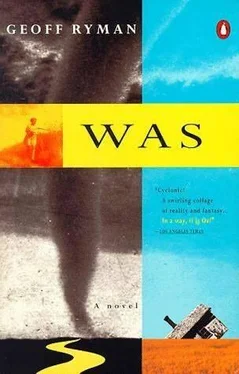The Riley County Historical Museum was made of plates of limestone, laid flat into the wall. It was set on a green slope, and halfway down that slope there was a barn and an old house.
1850s, said Jonathan's clock.
Breathing in sunset shadow, calming his stomach and his killer instinct, he stumbled down the hill toward the house.
It was made out of stone, obviously having grown in extensions from a smaller core. A large wooden room had also been added about the same time, now painted orange with green shutters. Another young person was climbing out of it, with a key.
"How old?" asked Jonathan. "How old is it?"
"The first rooms of the house were built in the 1850s. Do you know about the Goodnow House?" The delivery was practiced, polished.
"I'd love to," said Jonathan.
"Well, okay. The first rooms were built in 1855 when Isaac Goodnow and his wife, Ellen, came to live in Manhattan. It was called Boston at the time." She smiled. "Isaac Goodnow was a staunch abolitionist and a friend of Abraham Lincoln's. I'm afraid the house is closed for the afternoon, otherwise I could show you the envelope we have addressed to Professor Goodnow in Lincoln's own hand. The house is fully furnished with pieces either belonging to the Goodnows or to the period. The Goodnow furniture came to us through Harriet Parkerson, one of the Goodnows' two nieces who came to live with them."
"Why are there so many nice young people here?" asked Jonathan.
"Uh?" said the girl. "Oh, that's because of KSU."
It sounded like a symptom.
"Kansas State University," she giggled and made a helpless gesture. "That's where I'm studying. Um. In fact, KSU was founded by Isaac Goodnow. It started out as an agricultural college. Blue Mont College."
"Why is there brick in the wall?"
He was confusing her. He pointed. The limestone wall had a snake of brick down its front.
"That's the chimney. You see how it curves around the window? Well, that's because Mrs. Goodnow wanted to have a window there and they had to build the chimney around it. That room there is where one of the nieces slept. She was Etta Parkerson and she worked for the Goodnows. Um. We actually have her diary from that time, with photographs of the house and family. Would you like to purchase a copy?"
"Oh, please," said Jonathan, in a voice like the wind.
The girl stared at him for a moment. "Okay."
Without moving otherwise he passed her his credit card. He was leaving a trail of numbers behind him.
Then he tried to photograph the house.
30 30 30. Too dark.
"You're going to have to do it without the camera, this time," said a voice.
Jonathan thought it was the KSU student. He turned, but she was gone. There was no one there.
"You'll have to do it for yourself," said the child's voice.
The student came back with books, and Jonathan held out the camera bag toward her.
"Here," he said. "Take this. Keep it."
"I can't take this, this is an expensive camera."
"I can't use it," said Jonathan.
"Look, it's got a book of instructions."
"It will just be a burden," said Jonathan, and cast off one more thing. "I think it will keep me from seeing."
The room at the Best Western was exactly as Jonathan had hoped it would be, clean and anonymous, with a patterned quilt over the bed, and ornate lighting on a brass chain and cable TV. It was stuffy, though. It only had a huge French window that would let in both air and burglars. Jonathan had developed an unreasoning fixation about being burgled. He did not open the windows.
The room also had two doors, one leading out to the pool, the other to the parking lot. This confused Jonathan. He chained and double-locked the door leading to the pool. He went out through the parking lot door to get a Coke. He tried to get back in through the wrong door. His key didn't seem to work. He tried the key in several different doors. This caused nervous women to cry out, "Who is it?" He asked for Angel's help. "Which door did you come out of?" she asked, finally.
Back inside his room, he went to work, sipping a Diet Coke. He still thought that he needed to lose weight.
There was no Branscomb listed in the census.
There was a Bradley, D. W., blacksmith, twenty-six years old, white male, from Illinois, living in Manhattan City. Married to C. W. Bradley, twenty-four, and living with L. H. Bradley who appeared to be both five and twelve years old.
Same ages as Dorothy. Five in the book, twelve in the movie.
There was Brady, Susan, forty, white female, seamstress, from Virginia, Manhattan City. She lived with Lewis and Betty, eighteen and fourteen respectively.
A widow?
Jonathan saw her in his mind, as if in a photograph, wide gray dress with neat black trim and neat black hair pulled back. Susan Brady had an earnest, slightly smiling, honest face.
Then came Breese, a farmer from Indiana, with lots of children.
No Branscomb.
So he looked for Gale. He hit pay dirt.
There it was; he had found her; there was an H. S. Gale, from Iowa, living in Zeandale. Thirty-three years old, born in New York State. Twenty-eight-year-old wife from Pennsylvania, with four children. Only one of them was a female, twelve years old in 1875. Would that be about right? Initials A.L. Anna Louise? Not Dorothy.
But maybe that was where Dorothy came to stay.
Grow, Guduhan, Guinn, Gulch…
Maybe not.
What now? Bill had said she lived near Manhattan, but that could mean anywhere in hundreds of square miles. Jonathan had another thought: Oh, Lord. What if she went to stay with her mother's sister? If she had married, the name wouldn't be Gael or Branscomb. It would be another name altogether.
"Fool's gold," he murmured.
He took out the Xeroxed memoir.
In the upper right-hand corner there was dim Xerox pencil writing: Donated by Annie Pratt, copied by her from papers written by author.
It was typed, in a very old-fashioned, heavily serifed face.
"Pioneer Beauty," it said, without further accreditation.
We came to Manhattan in the fall of 1857 because of the first sacking of Lawrence the year before. We were hardened to pioneer life by then. Manhattan was even then a sizable place, not too unlike Lawrence.
We had nothing to start with except our hands and feet and some land the good Josiah Pillsbury let us have on very reasonable terms. The land was heavily wooded, and so with the help of the Pillsburys and Mr. Monroe Scranton, we soon had a house.
Out on the wild hills, the grass was taller than a man, and my little sister and I used to walk through it back to back because it was said the wolves would not attack if your eyes were upon them. We called them wolves because of the howling. They would be recognized as coyotes now, but they seemed no less threatening because of that.
Sometimes we could see the wild deer ranging on the bare hillsides. Sometimes we could see the wolves basking in the sun after getting all they could eat.
There were many Indians in those days. They used to pass by our house en route from the reservation near Council Grove to cross the Kaw to get to hunting grounds or to raid the Pawnees.
They would come to our door, wishing to trade venison for some bacon or cornmeal. They would visit for an hour or so and piece quilts. They were very friendly and inclined to be neighborly, to our family especially. My father Matthew was an abolitionist and journalist and took the treatment of the Kansas very much to heart. Already squatters were flooding their reservation. Demands were being made to President Buchanan to reduce its size. The stated intention was to remove them from the land altogether! And yet, years later, these same Indians were to be drafted into the Union Army!
My little sister seemed to be their particular delight. She was nine years old and had long blond hair which the Indians found fascinating. They would sit at our table and tell us stories in halting English of the hunt and their great seasonal treks. At this stage, the Kansa tribe still wore Indian dress, headscarves and leather trousers. At first I felt a great deal of concern over their presence. At sixteen, I was able to leave them with the impression that I was the lady of the house, a married woman, which I felt gave me a measure of protection. I was worried about little Millie, but I need not have. First, Millie, as always, seemed to dance over any difficulty. Secondly, the Indians themselves were as far as I could see a peaceable people, interested mostly in trading and the conversation which accompanied it.
Читать дальше












